Reflective Analysis of Information Technology Research Lectures
VerifiedAdded on 2023/06/04
|6
|1231
|419
Journal and Reflective Writing
AI Summary
This reflective analysis examines a student's learning journey through a series of lectures on IT research. The analysis covers a range of topics, beginning with the role of IT in organizational innovation and the importance of effective communication in the IT sector, and then delves into quantitative research methodologies, exploring concepts such as positivism, realism, and the scientific method. The analysis further investigates qualitative research, including constructivism, interpretivism, and various qualitative data collection methods. The student reflects on the components of a research proposal and the ethical considerations involved in research, including academic misconduct and plagiarism. Finally, the analysis highlights the significance of information technology in modern life and its various applications.
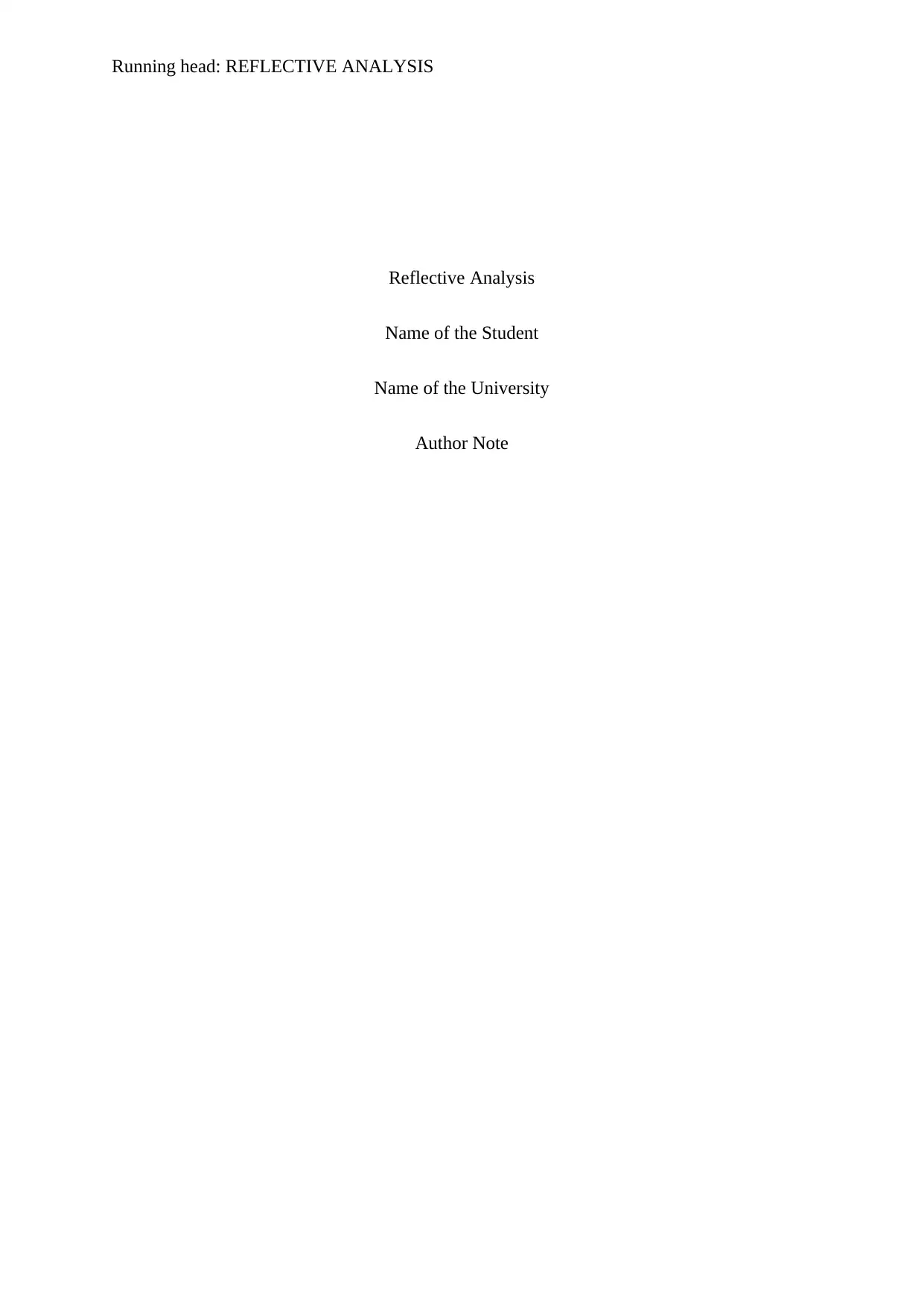
Running head: REFLECTIVE ANALYSIS
Reflective Analysis
Name of the Student
Name of the University
Author Note
Reflective Analysis
Name of the Student
Name of the University
Author Note
Paraphrase This Document
Need a fresh take? Get an instant paraphrase of this document with our AI Paraphraser
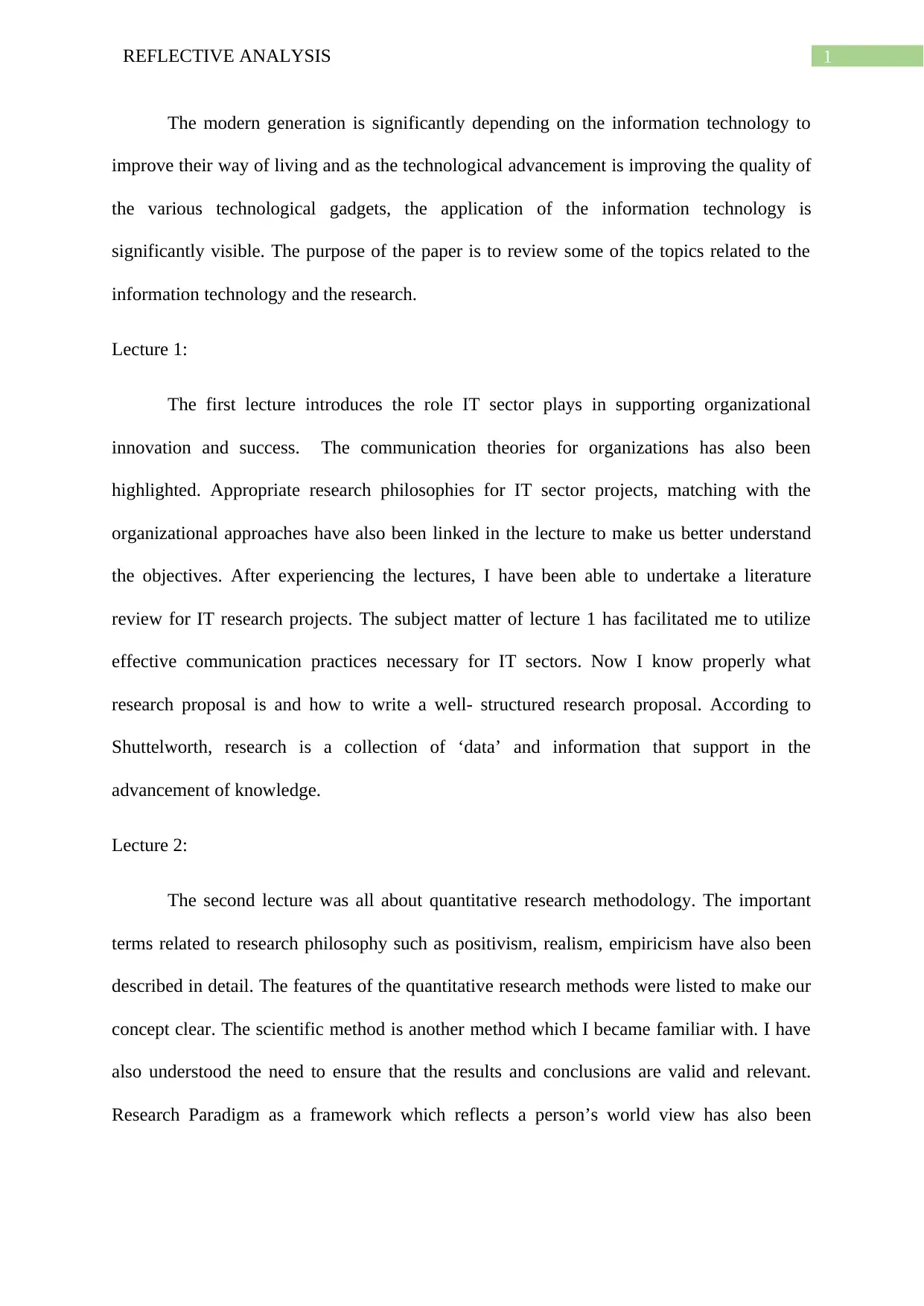
1REFLECTIVE ANALYSIS
The modern generation is significantly depending on the information technology to
improve their way of living and as the technological advancement is improving the quality of
the various technological gadgets, the application of the information technology is
significantly visible. The purpose of the paper is to review some of the topics related to the
information technology and the research.
Lecture 1:
The first lecture introduces the role IT sector plays in supporting organizational
innovation and success. The communication theories for organizations has also been
highlighted. Appropriate research philosophies for IT sector projects, matching with the
organizational approaches have also been linked in the lecture to make us better understand
the objectives. After experiencing the lectures, I have been able to undertake a literature
review for IT research projects. The subject matter of lecture 1 has facilitated me to utilize
effective communication practices necessary for IT sectors. Now I know properly what
research proposal is and how to write a well- structured research proposal. According to
Shuttelworth, research is a collection of ‘data’ and information that support in the
advancement of knowledge.
Lecture 2:
The second lecture was all about quantitative research methodology. The important
terms related to research philosophy such as positivism, realism, empiricism have also been
described in detail. The features of the quantitative research methods were listed to make our
concept clear. The scientific method is another method which I became familiar with. I have
also understood the need to ensure that the results and conclusions are valid and relevant.
Research Paradigm as a framework which reflects a person’s world view has also been
The modern generation is significantly depending on the information technology to
improve their way of living and as the technological advancement is improving the quality of
the various technological gadgets, the application of the information technology is
significantly visible. The purpose of the paper is to review some of the topics related to the
information technology and the research.
Lecture 1:
The first lecture introduces the role IT sector plays in supporting organizational
innovation and success. The communication theories for organizations has also been
highlighted. Appropriate research philosophies for IT sector projects, matching with the
organizational approaches have also been linked in the lecture to make us better understand
the objectives. After experiencing the lectures, I have been able to undertake a literature
review for IT research projects. The subject matter of lecture 1 has facilitated me to utilize
effective communication practices necessary for IT sectors. Now I know properly what
research proposal is and how to write a well- structured research proposal. According to
Shuttelworth, research is a collection of ‘data’ and information that support in the
advancement of knowledge.
Lecture 2:
The second lecture was all about quantitative research methodology. The important
terms related to research philosophy such as positivism, realism, empiricism have also been
described in detail. The features of the quantitative research methods were listed to make our
concept clear. The scientific method is another method which I became familiar with. I have
also understood the need to ensure that the results and conclusions are valid and relevant.
Research Paradigm as a framework which reflects a person’s world view has also been
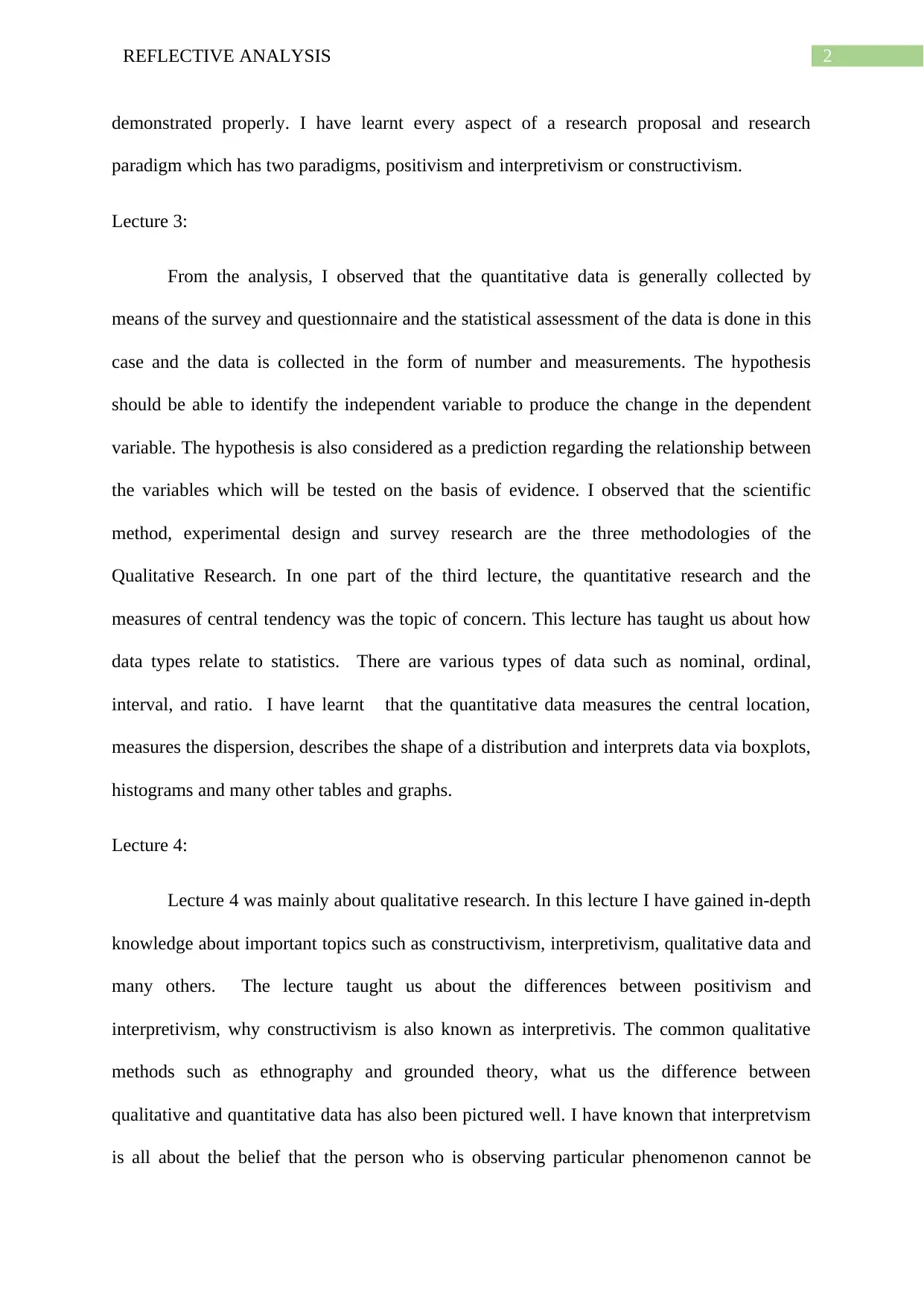
2REFLECTIVE ANALYSIS
demonstrated properly. I have learnt every aspect of a research proposal and research
paradigm which has two paradigms, positivism and interpretivism or constructivism.
Lecture 3:
From the analysis, I observed that the quantitative data is generally collected by
means of the survey and questionnaire and the statistical assessment of the data is done in this
case and the data is collected in the form of number and measurements. The hypothesis
should be able to identify the independent variable to produce the change in the dependent
variable. The hypothesis is also considered as a prediction regarding the relationship between
the variables which will be tested on the basis of evidence. I observed that the scientific
method, experimental design and survey research are the three methodologies of the
Qualitative Research. In one part of the third lecture, the quantitative research and the
measures of central tendency was the topic of concern. This lecture has taught us about how
data types relate to statistics. There are various types of data such as nominal, ordinal,
interval, and ratio. I have learnt that the quantitative data measures the central location,
measures the dispersion, describes the shape of a distribution and interprets data via boxplots,
histograms and many other tables and graphs.
Lecture 4:
Lecture 4 was mainly about qualitative research. In this lecture I have gained in-depth
knowledge about important topics such as constructivism, interpretivism, qualitative data and
many others. The lecture taught us about the differences between positivism and
interpretivism, why constructivism is also known as interpretivis. The common qualitative
methods such as ethnography and grounded theory, what us the difference between
qualitative and quantitative data has also been pictured well. I have known that interpretvism
is all about the belief that the person who is observing particular phenomenon cannot be
demonstrated properly. I have learnt every aspect of a research proposal and research
paradigm which has two paradigms, positivism and interpretivism or constructivism.
Lecture 3:
From the analysis, I observed that the quantitative data is generally collected by
means of the survey and questionnaire and the statistical assessment of the data is done in this
case and the data is collected in the form of number and measurements. The hypothesis
should be able to identify the independent variable to produce the change in the dependent
variable. The hypothesis is also considered as a prediction regarding the relationship between
the variables which will be tested on the basis of evidence. I observed that the scientific
method, experimental design and survey research are the three methodologies of the
Qualitative Research. In one part of the third lecture, the quantitative research and the
measures of central tendency was the topic of concern. This lecture has taught us about how
data types relate to statistics. There are various types of data such as nominal, ordinal,
interval, and ratio. I have learnt that the quantitative data measures the central location,
measures the dispersion, describes the shape of a distribution and interprets data via boxplots,
histograms and many other tables and graphs.
Lecture 4:
Lecture 4 was mainly about qualitative research. In this lecture I have gained in-depth
knowledge about important topics such as constructivism, interpretivism, qualitative data and
many others. The lecture taught us about the differences between positivism and
interpretivism, why constructivism is also known as interpretivis. The common qualitative
methods such as ethnography and grounded theory, what us the difference between
qualitative and quantitative data has also been pictured well. I have known that interpretvism
is all about the belief that the person who is observing particular phenomenon cannot be
⊘ This is a preview!⊘
Do you want full access?
Subscribe today to unlock all pages.

Trusted by 1+ million students worldwide
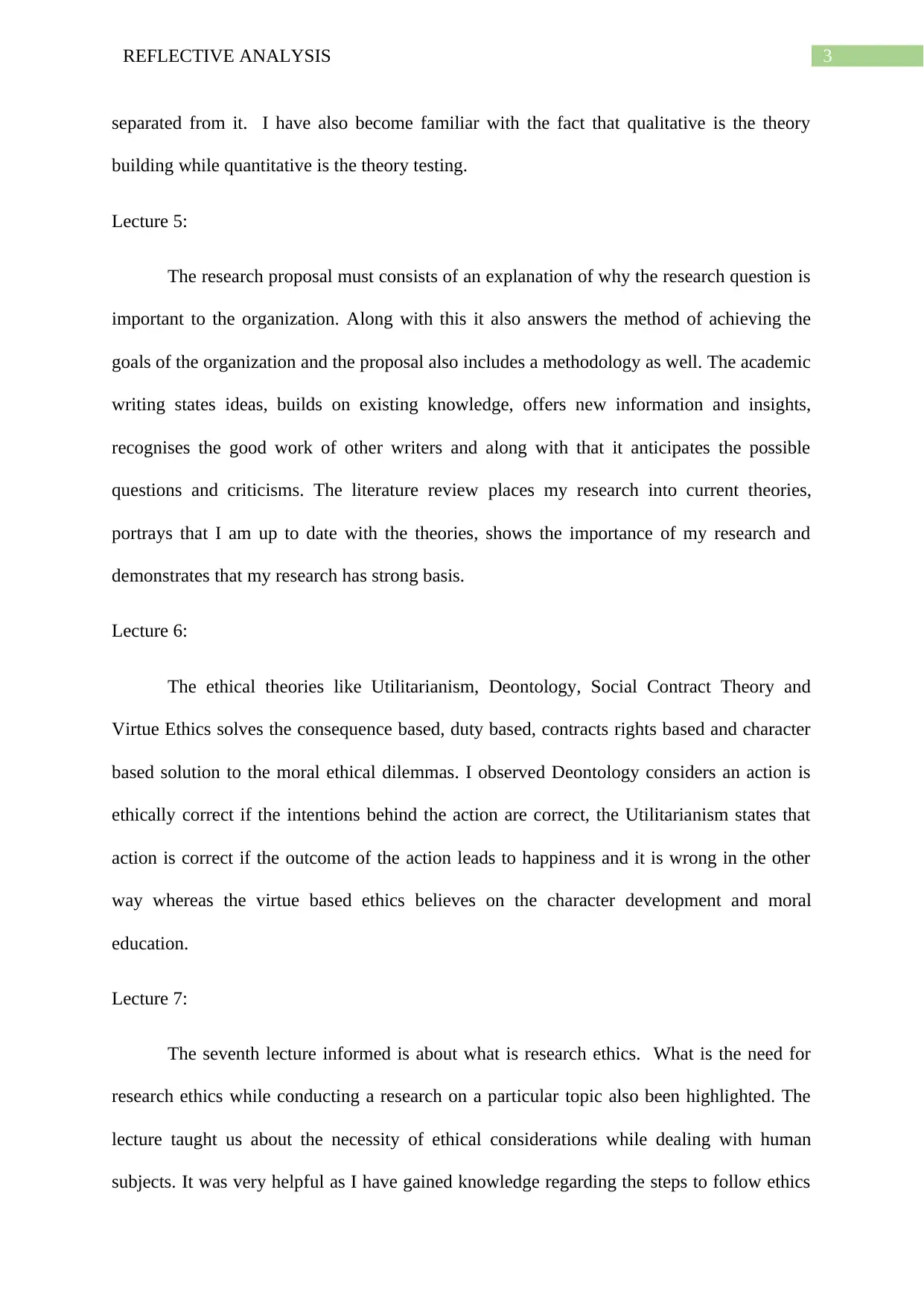
3REFLECTIVE ANALYSIS
separated from it. I have also become familiar with the fact that qualitative is the theory
building while quantitative is the theory testing.
Lecture 5:
The research proposal must consists of an explanation of why the research question is
important to the organization. Along with this it also answers the method of achieving the
goals of the organization and the proposal also includes a methodology as well. The academic
writing states ideas, builds on existing knowledge, offers new information and insights,
recognises the good work of other writers and along with that it anticipates the possible
questions and criticisms. The literature review places my research into current theories,
portrays that I am up to date with the theories, shows the importance of my research and
demonstrates that my research has strong basis.
Lecture 6:
The ethical theories like Utilitarianism, Deontology, Social Contract Theory and
Virtue Ethics solves the consequence based, duty based, contracts rights based and character
based solution to the moral ethical dilemmas. I observed Deontology considers an action is
ethically correct if the intentions behind the action are correct, the Utilitarianism states that
action is correct if the outcome of the action leads to happiness and it is wrong in the other
way whereas the virtue based ethics believes on the character development and moral
education.
Lecture 7:
The seventh lecture informed is about what is research ethics. What is the need for
research ethics while conducting a research on a particular topic also been highlighted. The
lecture taught us about the necessity of ethical considerations while dealing with human
subjects. It was very helpful as I have gained knowledge regarding the steps to follow ethics
separated from it. I have also become familiar with the fact that qualitative is the theory
building while quantitative is the theory testing.
Lecture 5:
The research proposal must consists of an explanation of why the research question is
important to the organization. Along with this it also answers the method of achieving the
goals of the organization and the proposal also includes a methodology as well. The academic
writing states ideas, builds on existing knowledge, offers new information and insights,
recognises the good work of other writers and along with that it anticipates the possible
questions and criticisms. The literature review places my research into current theories,
portrays that I am up to date with the theories, shows the importance of my research and
demonstrates that my research has strong basis.
Lecture 6:
The ethical theories like Utilitarianism, Deontology, Social Contract Theory and
Virtue Ethics solves the consequence based, duty based, contracts rights based and character
based solution to the moral ethical dilemmas. I observed Deontology considers an action is
ethically correct if the intentions behind the action are correct, the Utilitarianism states that
action is correct if the outcome of the action leads to happiness and it is wrong in the other
way whereas the virtue based ethics believes on the character development and moral
education.
Lecture 7:
The seventh lecture informed is about what is research ethics. What is the need for
research ethics while conducting a research on a particular topic also been highlighted. The
lecture taught us about the necessity of ethical considerations while dealing with human
subjects. It was very helpful as I have gained knowledge regarding the steps to follow ethics
Paraphrase This Document
Need a fresh take? Get an instant paraphrase of this document with our AI Paraphraser
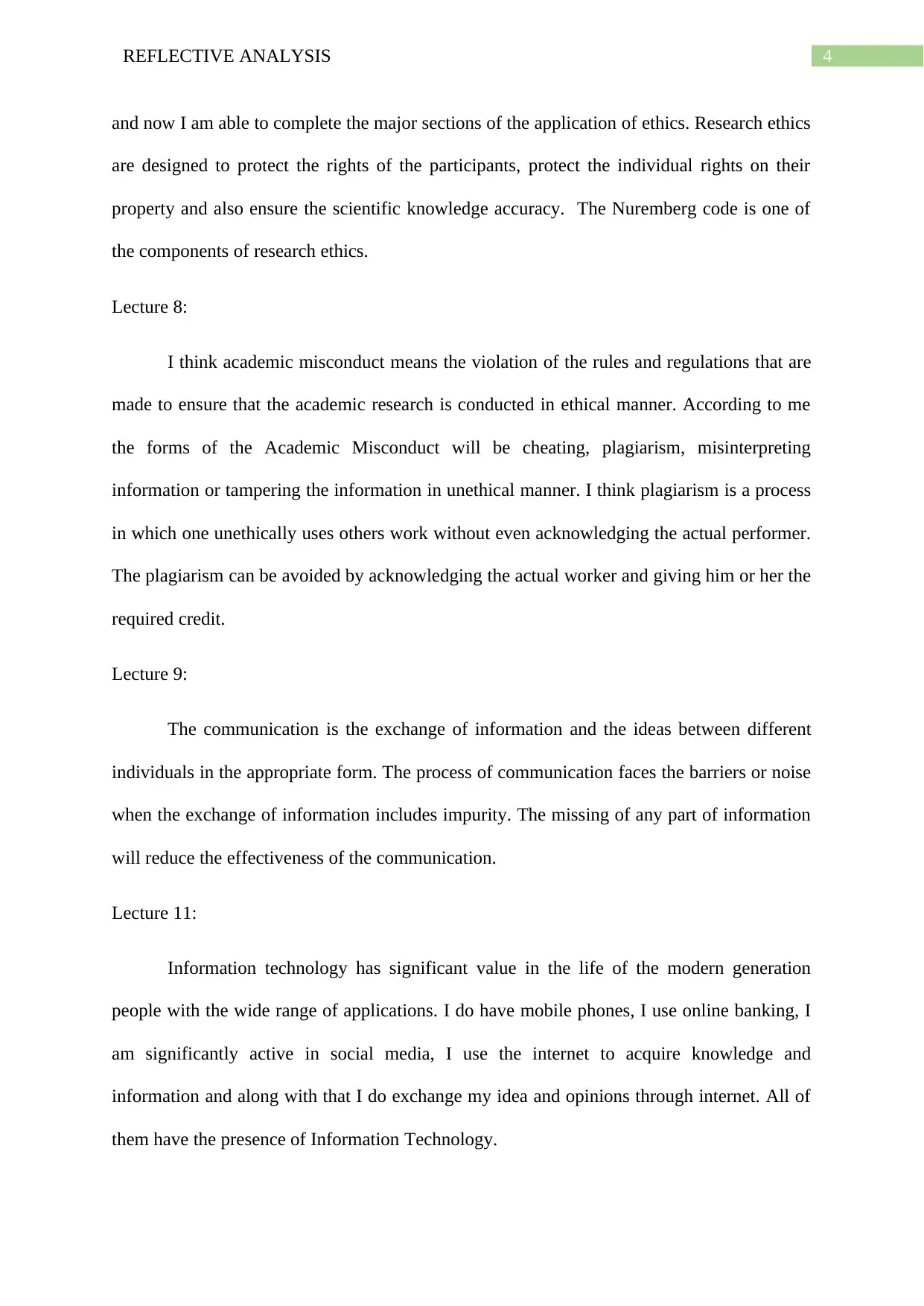
4REFLECTIVE ANALYSIS
and now I am able to complete the major sections of the application of ethics. Research ethics
are designed to protect the rights of the participants, protect the individual rights on their
property and also ensure the scientific knowledge accuracy. The Nuremberg code is one of
the components of research ethics.
Lecture 8:
I think academic misconduct means the violation of the rules and regulations that are
made to ensure that the academic research is conducted in ethical manner. According to me
the forms of the Academic Misconduct will be cheating, plagiarism, misinterpreting
information or tampering the information in unethical manner. I think plagiarism is a process
in which one unethically uses others work without even acknowledging the actual performer.
The plagiarism can be avoided by acknowledging the actual worker and giving him or her the
required credit.
Lecture 9:
The communication is the exchange of information and the ideas between different
individuals in the appropriate form. The process of communication faces the barriers or noise
when the exchange of information includes impurity. The missing of any part of information
will reduce the effectiveness of the communication.
Lecture 11:
Information technology has significant value in the life of the modern generation
people with the wide range of applications. I do have mobile phones, I use online banking, I
am significantly active in social media, I use the internet to acquire knowledge and
information and along with that I do exchange my idea and opinions through internet. All of
them have the presence of Information Technology.
and now I am able to complete the major sections of the application of ethics. Research ethics
are designed to protect the rights of the participants, protect the individual rights on their
property and also ensure the scientific knowledge accuracy. The Nuremberg code is one of
the components of research ethics.
Lecture 8:
I think academic misconduct means the violation of the rules and regulations that are
made to ensure that the academic research is conducted in ethical manner. According to me
the forms of the Academic Misconduct will be cheating, plagiarism, misinterpreting
information or tampering the information in unethical manner. I think plagiarism is a process
in which one unethically uses others work without even acknowledging the actual performer.
The plagiarism can be avoided by acknowledging the actual worker and giving him or her the
required credit.
Lecture 9:
The communication is the exchange of information and the ideas between different
individuals in the appropriate form. The process of communication faces the barriers or noise
when the exchange of information includes impurity. The missing of any part of information
will reduce the effectiveness of the communication.
Lecture 11:
Information technology has significant value in the life of the modern generation
people with the wide range of applications. I do have mobile phones, I use online banking, I
am significantly active in social media, I use the internet to acquire knowledge and
information and along with that I do exchange my idea and opinions through internet. All of
them have the presence of Information Technology.

5REFLECTIVE ANALYSIS
⊘ This is a preview!⊘
Do you want full access?
Subscribe today to unlock all pages.

Trusted by 1+ million students worldwide
1 out of 6
Related Documents
Your All-in-One AI-Powered Toolkit for Academic Success.
+13062052269
info@desklib.com
Available 24*7 on WhatsApp / Email
![[object Object]](/_next/static/media/star-bottom.7253800d.svg)
Unlock your academic potential
Copyright © 2020–2026 A2Z Services. All Rights Reserved. Developed and managed by ZUCOL.





